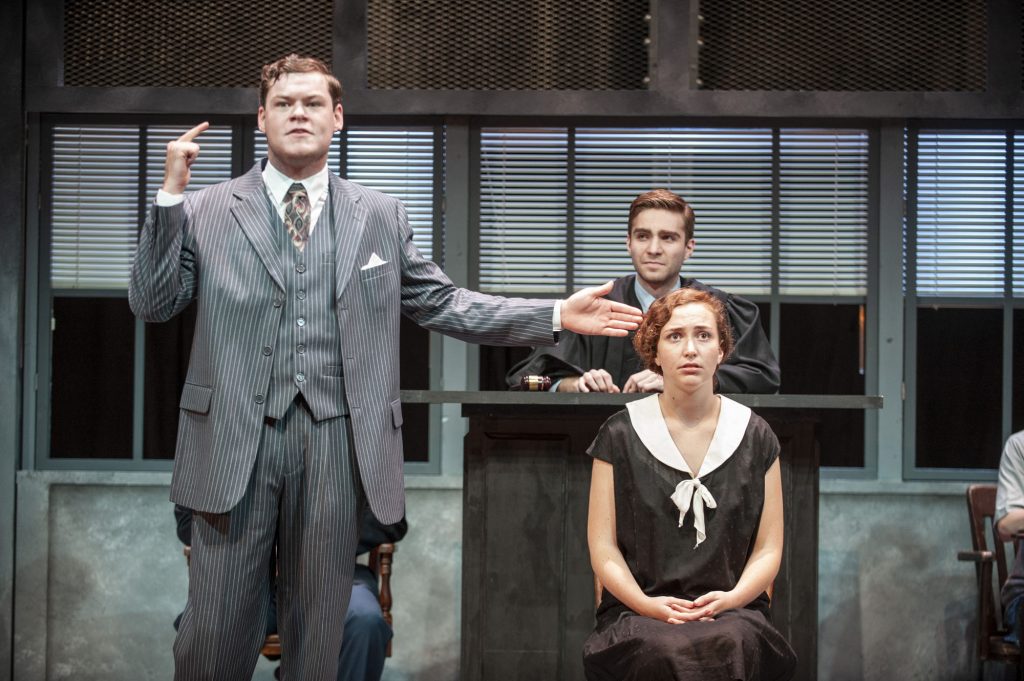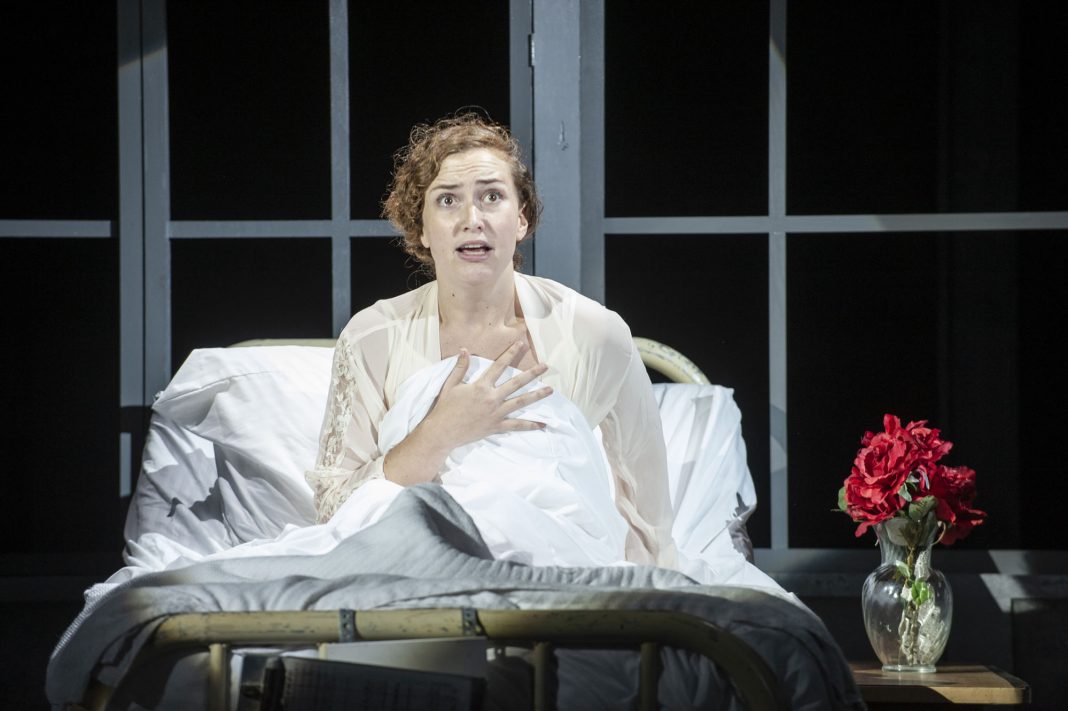Sophie Treadwell’s Machinal cannot be contained. There’s no stopping that story, no end when the lights come up and the people get on their feet and the actors wipe away streaky tears as they bow. There’s no blissful reprieve from reality, no relief at being released into the outside world. There’s only a reverent hush, faces around you that can’t quite pick themselves up from where they fell and the devastating knowledge that the costumed people on stage will have to relive all of this again and again and again over the next days. Machinal. Machine-like.
Of course, the actors’ performances were anything but – running from Sept. 27 to 30, this first Mainstage was dynamic and passionate, centering some of the most discomfiting moments in one woman’s life on a stark set that changed with the scenes to reflect each one’s respective mood. Directed by Baker Artist-in-Residence Lou Jacob, Machinal was written in 1928 by progressive journalist Sophie Treadwell as a fictionalization of the trial of Ruth Snyder, who in the same year was executed by electric chair after murdering her husband. According to dramaturg Alice Banta ’21, the playwright was in the room for all of Snyder’s trial and published Machinal shortly after its proceedings.
The play itself follows nine episodes in the life of the Young Woman, who, under both real and imagined societal duress, reluctantly decides to marry her boss after he relentlessly pursues her for her beautiful hands. Still, she flinches at his slightest touch, and when he eventually comes to visit her in the hospital after the birth of their child, she becomes physically sick at his constant didacticism and punchy (yet completely oblivious) life advice. Years later, the Young Woman meets a Man in a speakeasy, with whom she is immediately taken despite the fact that he openly claims to have murdered two Mexican bandits in order to “get free” from their grasp. In fact, it is this aspect of the Man that seems to draw the Young Woman to him, along with the genuine tactile and sexual desire he rouses within her: his tale of “getting free” rings in the Young Woman’s head for months during their affair, ultimately driving the Young Woman to kill her still-grotesque husband in the same brutal way that the Man killed the bandits. She thus achieves freedom from her husband’s condescending tyranny but is put on trial and ultimately executed for murder in the play’s horrific final scene.
Julia Baker ’19 brought to life the Young Woman, an astonishingly difficult role that left audience members wondering how she managed to enter the character’s headspace on a daily basis. With each performance, Baker faced the task of believably enacting everything from haunting fear to bottomless despair to bubbling joy peppered with frenetic monologues made up of only a few coherent words wrapped in repetitive and cyclical patterns of thought.
“In all honesty, I worked really hard at this. [The Young Woman] really mattered to me,” said Baker. “I guess I feel pretty lucky to have had such a strong support system to fall back on as well. This may be a bit pretentious, but Young Woman occupied a lot of my waking thought. I literally couldn’t get her off of my mind. It was a bit consuming, which was actually a little scary. But I feel so lucky that my friends, family, Lou [Jacob] and Matt Beaune [‘20] were endlessly there for me with constant support in the wake of this role. I really wanted to understand her, so I took on a lot of her weight and gravity. Returning back to my own life was maybe sometimes a bit jumbled, but I kept reminding myself, especially in moments of extreme emotion, that she was not me; that while I was telling her story, it was not my own. I feel so indebted to this story, though. This woman is endlessly and ceaselessly amazing, because she fights.”

And fight she does – Baker’s character is most often directly in conflict with herself, with the internalized voice of society that’s been incorporated into her mind. “He’s the only man that’s ever asked me,” she nervously tells her mother of her boss’s marriage proposal. “And I suppose I got to marry somebody – all girls do.” As the Young Woman talks of the man who will become her husband and later recoils from his every move, Baker invokes in the audience an extraordinary sense of dread. Baker’s voice quavers, her face creased in a mask of misery. We, too, come to jump when her husband approaches her. We, too, beg for a reprieve from his unceasing paternalism. Though his on-stage touches are never expressly violent, we understand her repulsion and feel the pain of it sharp and hot at the bottom of our stomachs.
Though these tense scenes in which the Young Woman teeters on the edge of sanity were certainly powerful, perhaps the scene that left the biggest impression on the audience was one that showcased her three-dimensional personality uncensored by horror, as illustrated here by audience member Kayla Robinson ’20.
“My favorite part to watch was the scene in the bar, where there were three ‘couples’ at three different tables, all having very different conversations,” Robinson said. “It was interesting to see [The Young Woman] as a ‘normal’ person, not panicking and inside her head, but more in the moment and enjoying herself, and it was interesting to contrast that to her other scenes as well as the conversations happening at nearby tables, whether they were funny or serious … It felt kind of like a reminder that life goes on both with you and other people, even while you may not be feeling the best, and also a reminder that how you seem on the outside (cool, flirtatious) and how you feel on the inside (panicked, trapped, afraid) can be very different.”
According to Christian Gutierrez ’19, who played the charming but dubious Man, the show’s ensemble miraculously managed to craft both lighter and more intense scenes, all of which required immense amounts of character work, in just a month of rehearsal.
“The rehearsal process was very quick,” said Guttierez. “A month of rehearsal seems like a lot, but when you’re dealing with a show that has so many parts and mysteries, you wish you had more time, although collaborating with Lou made it painless and productive, and I always felt like we were in good hands.”
Still, the process wasn’t always painless, especially for Baker whilst constructing the show’s final scene. In the ninth episode, the Young Woman sits drained as a priest throws rote phrases from the Bible at her. When two male officers shave part of her head, she fights back. “I will not be submitted!” she cries, so guttural even recalling it makes my heart beat faster. She is held down, her mouth forcibly covered by a guard’s hand. Tears streaming down her face, she asks the priest why she was born and where she will be after death, attempting to reconcile her personal heavens and hells with her more existential fate. Soon after, she is moved to the electric chair, her struggling arms held fast.
“Finding the release of that is really hard, because I’ve never been in a situation in which I know that I’m going to die,” Baker said. It’s a really frightening place to be in. And to go there with so many people watching … it’s nerve-wracking. But I kept reminding myself that this woman tries and tries and tries to make sense of it all; it seems as though this is her catharsis of finally vocalizing the questions she’s pent up inside herself for so long, and they simply pour out of her … Finding her voice aided tremendously in this scene.”
Ultimately, though this play is ninety years old, it contains unbelievably current ideas, perhaps articulated best by Baker herself:
“In light of the Kavanaugh case, I find this play particularly relevant. The violation of women’s bodies in the context of men in power is entrenched within this piece, and Dr. Ford’s immense bravery in coming forth with her story inspired me immensely. Women are still being violated. Women are still oppressed for seeking something other than marriage and family life. Women are still perceived by society as inferior to men. This play is not the Kavanaugh case. But the relevancy of a 90-year-old dialogue replicated in a modern courtroom enrages me. The injustice against women’s bodies plague the quotidian. I am so incredibly proud to know that there are women like Dr. Ford who are willing to stand up to their oppressors and attempt to right the endless wrong enacted against women systematically for centuries. Dr. Ford is strong, because she is honest and brave. I am inspired by women like her. Any translation of that into any piece of theater I may be lucky enough to perform in … well, that’s why I do it.”
Brooke is a senior double majoring in English and Media & Communication. She's passionate about french toast, Kate Bishop, Steven Universe and the ocean coasts of Ireland. On campus, she is a Writing Tutor, Orientation Leader and member of the Girls Next Door, Muhlenberg's all-lady a capella group. She could not be more excited to serve as your Editor-In-Chief this year!






















